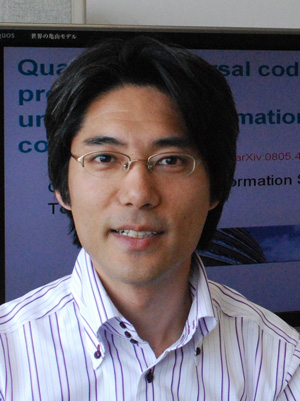Highlights
Prestigious information theory award won by CQT's Masahito Hayashi

For fundamental work in communication theory, CQT Visiting Research Associate Professor Masahito Hayashi has won the 2011 IEEE Information Theory Paper award. He shares the award with the authors of one other paper.
"It is one of the most prestigious citations in the field of information theory; looking down the list of previous winners is like reviewing the history of information theory itself," says Andreas Winter, the CQT Principal Investigator whose group Masahito works within. Masahito spends around four months per year at CQT.
Masahito's winning paper "Information-Spectrum Approach to Second-Order Coding Rate in Channel Coding" was published in IEEE Trans. Inform. Theory in November 2009 (arXiv:0801.2242). The work extends the application of a powerful technique known as the "information spectrum method".
The information spectrum method had been used in the past to predict the approximate length of channel communication codes. Such codes are designed to transmit information over imperfect communication channels: the code is constructed so that errors up to a specified rate can be tolerated. Practically, it is useful to know how the length of the encoding scales with the number of bits, n, to be transmitted.
Previously the information spectrum method had predicted the leading-order growth of the code (which is linear in n). Masahito's work shows that the method can also predict the second-order term (proportional to the square root of n).
The finding relates to classical information transmission, but Masahito says his background in quantum information pointed the way. "In this paper, I introduce a very new perspective for information theory, one which you could understand without quantum information, but couldn't find without quantum information," he says. Moreover, he says that being one of only a few researchers to work at the intersection of quantum information and traditional information theory "gives me an advantage, it is easier for me to do novel work".
The awards were announced at the 2011 IEEE International Symposium on Information Theory, held 31 July - 5 August in Saint Petersburg, Russia. As well as prestige, the prize is worth US$2000, of which Masahito has won a US$1000 share.
Masahito is an Associate Professor at Tohoku University in Sendai, Japan. In 2010, he won the IBM Japan Science Prize in Computer Science for a different body of work. He says he was surprised to learn that the IEEE Information Theory Society had chosen this channel-coding paper for its prize. "When I listed my top five papers, I didn't use to list this paper. Now that will change," he says.






